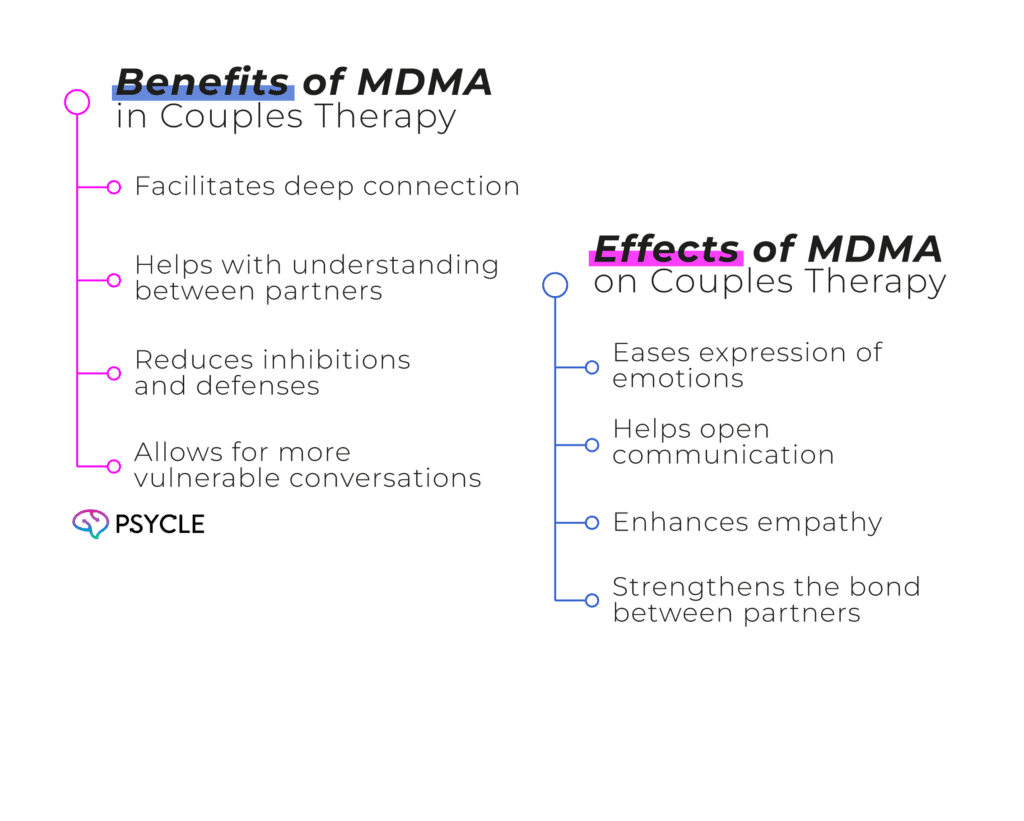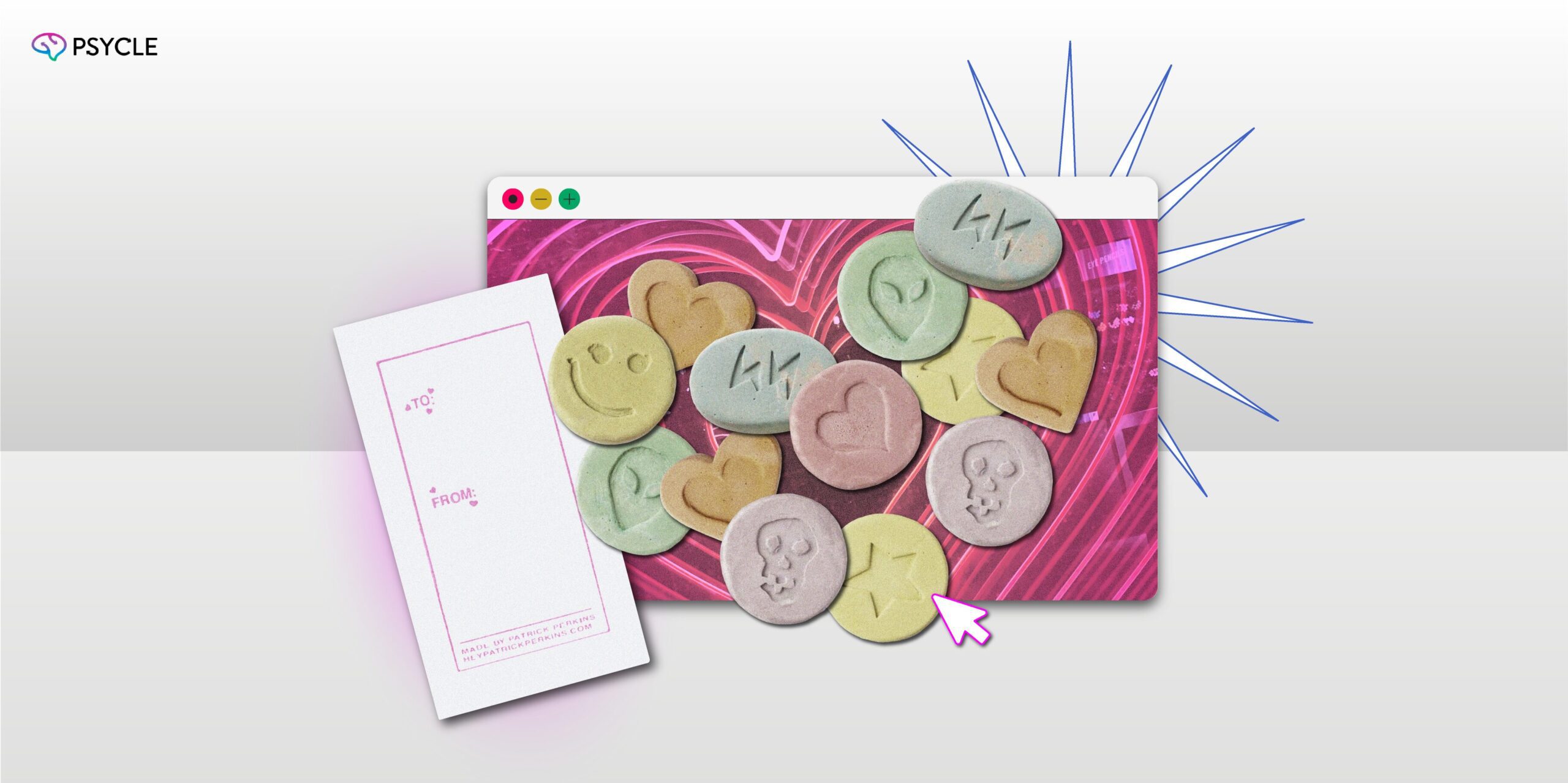MDMA has been recognized as a powerful tool in couples therapy since the 1980s. This article will explore the science, research, and potential of using MDMA to foster empathy, treat relationship wounds, and improve communication between partners.
Key Takeaways
- MDMA therapy shows promise in enhancing emotional connection and communication within romantic relationships.
- The drug’s ability to induce feelings of empathy, trust, and emotional openness can facilitate breakthroughs and promote healing in therapy sessions.
- Elevated levels of serotonin and oxytocin in the brain contribute to MDMA’s therapeutic effects, fostering deeper emotional exploration and interpersonal connection.
- MDMA aids in the formation of “emotional bridges” between partners, allowing for more honest and vulnerable communication during therapy sessions.
- Historical research and contemporary studies support the positive impact of MDMA therapy on relational dynamics, including increased intimacy and satisfaction.
- Safety concerns must be addressed through medical supervision and thorough screening to mitigate potential risks associated with MDMA use in therapeutic settings.
The Transformative Potential of MDMA Therapy
MDMA is gaining increasing attention for its therapeutic benefits, particularly in the treatment of mental health conditions, including post-traumatic stress disorder and depression.
Its transformative potential lies in its ability to induce feelings of empathy, trust, and emotional openness, which can facilitate breakthroughs and promote healing when used in the context of psychotherapy.
MDMA elevates brain levels of the neurotransmitters serotonin and oxytocin, which is thought to play a crucial role in its healing effects. Serotonin is associated with mood and may contribute to the emotional openness, joy, and empathy experienced on MDMA. Oxytocin is often called the “love hormone” and is associated with social bonding and trust.
By promoting the release of oxytocin, MDMA may facilitate a sense of connection and trust between the therapist and patient, as well as between partners in couples therapy.
MDMA has also been shown to reduce blood flow to the amygdala – a brain region responsible for processing fear and emotional responses. This can help individuals approach traumatic memories and difficult emotions without feeling overwhelmed or triggered.
Through aiding individual healing, MDMA can help individuals in their interpersonal lives, including romantic relationships. MDMA may also be used directly to heal romantic relationships by aiding couples therapy.
MDMA’s Impact on Emotional Bridges
An emotional bridge refers to the connection and understanding between partners on an emotional level, where they feel deeply attuned to each other’s feelings and experiences. MDMA facilitates the creation of these bridges by reducing inhibitions and lowering defenses, allowing for a more vulnerable and honest conversation during couples therapy.
Couples under the influence of MDMA may find it easier to express their emotions, communicate openly, and empathize with each other’s perspectives. This can strengthen the bond between partners and facilitate more meaningful and constructive communication, leading to greater intimacy and relational satisfaction.
Study Highlights on MDMA and Relationship Therapy
Before MDMA was made illegal in the mid-1980s, researchers from the Heffer Institute conducted a series of MDMA-assisted therapy sessions, including with couples. They reported couples had improvements in fear of emotional hurt and better communication following the MDMA sessions.
In more recent times, one study found over 60% of participants from an MDMA for PTSD trial had improved relationships with their partners 12 months following the therapy.
Another MDMA therapy for PTSD study specifically investigated the relational aspects of the therapy, providing MDMA combined with cognitive behavioral therapy (CBT) to both PTSD patients and their partners. At the six-month follow-up, both partners reported improvements in post-traumatic growth, relational support, and social intimacy. They also described having reduced conflict in the relationship.
Last year, researchers Colbert and Hughes published an investigation in which they interviewed couples who self-reported using MDMA to heal their relationships. Participating couples described positive effects on communication, intimate bonding, and a relationship “tune up.”

Insights from Couples Who’ve Undergone MDMA Therapy
In an article for Huffpost, guest writer Kurt Nemes described his experience participating in an MDMA therapy trial with his partner Laura.
The trial was focused on MDMA for alleviating anxiety and depression in cancer patients, which Kurt had been experiencing since the diagnosis of his pancreatic cancer and the constant need for routine check-ups following his chemotherapy.
“The area around my heart grows warm. The MDMA is opening my heart to Laura,” he said. “Soon, both Laura and I are sitting up in our beds. We gaze lovingly into each other’s eyes and express our undying love. We acknowledge the pain of the last four years and vow to support each other as we grow old together.”
In another article for Vice, writer Grant Stoddard described using MDMA in the comfort of his own home with his partner.
“Almost five years into our marriage, a new partner introduced me to the concept of “home rolling.” She used the term to refer to taking MDMA in a safe, familiar, and cozy environment to better connect with another person,” he said.
“The at-home experience was as profound and therapeutic as it was enjoyable. It reduced our fear and defensiveness, enhanced communication and introspection, and increased empathy and compassion between us.”
Addressing Safety Concerns
Despite its generally favorable safety profile, MDMA can produce side effects such as increased heart rate, elevated blood pressure, and feelings of anxiety or agitation. Individuals with pre-existing cardiovascular conditions or psychiatric disorders may be at higher risk of experiencing adverse effects.
One critical aspect of MDMA therapy is the presence of trained medical professionals who can oversee the session. Before treatment begins, thorough medical screening is essential to identify health conditions that might increase the risk of adverse reactions.
This ensures that participants receive appropriate care and minimize potential risks associated with MDMA use.
Proper dosage and administration are also key considerations in MDMA-assisted relationship therapy. Research suggests that lower doses, administered in a controlled setting, are associated with fewer adverse effects while still achieving therapeutic benefits.
Adhering to established dosing protocols helps mitigate the risk of overdose or misuse, contributing to a safer therapeutic environment for couples undergoing treatment.
MDMA’s Role in Modern Relationship Counseling
Though MDMA has clear therapeutic benefits, the drug remains a Schedule 1 equivalent compound across the globe. The only exception is in Australia, where MDMA therapy has been legalized for PTSD.
Currently, the only way to legally access MDMA couples therapy is by participating in clinical research.
However, as increasing evidence for its relational benefits continues to grow, MDMA-assisted couples therapy could become an available treatment in the future.
FAQs
What is MDMA Therapy?
MDMA therapy involves the controlled use of MDMA in psychotherapy sessions to facilitate emotional exploration, trust-building, and healing, particularly in the context of treating mental health conditions and improving relational dynamics.
What Does Research Show About MDMA in Couples Therapy?
Studies have highlighted the potential of MDMA therapy to enhance relationship therapy by promoting emotional openness, empathy, and trust between partners. Research suggests that MDMA-assisted therapy can facilitate deeper emotional connection and communication, leading to greater intimacy and relational satisfaction.
Is MDMA Therapy Safe?
While generally well-tolerated in controlled therapeutic settings, MDMA therapy does carry potential safety concerns. These include increased heart rate, elevated blood pressure, and feelings of anxiety or agitation. Thorough medical screening and supervision by trained professionals are essential to mitigate these risks and ensure the safety of participants.
How Do MDMA’s Biological Effects Explain its Benefits in Relationships?
MDMA’s neurological effects, such as increased serotonin and oxytocin levels, contribute to its positive impact on relationships. Serotonin is associated with mood regulation and emotional openness, while oxytocin promotes social bonding and trust. By enhancing these neurotransmitter systems, MDMA facilitates deeper emotional connection, empathy, and communication between partners, fostering greater intimacy and relational satisfaction.

